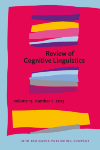
Review of Cognitive Linguistics
Scope & Guideline
Exploring the Intersection of Language and Mind
Introduction
Aims and Scopes
- Cognitive Linguistics Frameworks:
The journal focuses on the theoretical and practical applications of cognitive linguistics, exploring how language reflects and shapes human cognition. - Metaphor and Metonymy Studies:
A significant emphasis is placed on the analysis of metaphorical and metonymic expressions across various languages and contexts, examining their roles in communication and meaning construction. - Cross-Linguistic and Cross-Cultural Analysis:
The journal frequently publishes studies that compare linguistic phenomena across different languages and cultures, contributing to a deeper understanding of universal and language-specific cognitive processes. - Pedagogical Applications of Cognitive Linguistics:
Research that applies cognitive linguistic principles to language teaching and learning is a core area, highlighting the practical implications of cognitive theories for educational settings. - Corpus Linguistics Methodologies:
The use of corpus-based approaches to analyze language data is prevalent, allowing for empirical investigations into cognitive linguistic phenomena.
Trending and Emerging
- Figurative Language in Contemporary Contexts:
There is a growing interest in understanding how figurative language, including metaphors and metonymies, operates within modern discourse contexts, such as politics, media, and social issues. - Cognitive Approaches to Language Learning:
Recent studies are increasingly focusing on the implications of cognitive linguistics for language teaching, particularly how cognitive theories can enhance language acquisition and pedagogy. - Embodied Cognition and Language:
Emerging research is highlighting the role of embodied cognition in language use, exploring how physical experiences and gestures influence linguistic structures and meanings. - Interdisciplinary Studies Incorporating Technology:
The integration of technology, such as corpus linguistics tools and computational methods, is gaining traction, allowing for more sophisticated analyses of language data. - Cultural and Social Dimensions of Language:
Research is increasingly examining how cognitive linguistics intersects with cultural and social factors, emphasizing the role of language in shaping and reflecting cultural identities.
Declining or Waning
- Traditional Syntax and Grammar:
There seems to be a waning interest in traditional syntactic frameworks, as more researchers adopt cognitive approaches that emphasize usage-based and meaning-oriented perspectives. - Static Models of Language:
The exploration of static models that do not account for dynamic language use and cognitive processes is becoming less prevalent, as the field moves towards more fluid and context-sensitive analyses. - Descriptive Linguistics without Cognitive Insight:
Research that focuses solely on descriptive aspects of language without integrating cognitive insights appears to be decreasing, as the journal encourages more interdisciplinary approaches.
Similar Journals

Lingue e Linguaggio
Fostering Insights in Linguistics and Language StudiesLingue e Linguaggio, published by SOC ED IL MULINO, is a distinguished academic journal in the field of Linguistics and Language, hailing from Bologna, Italy. With an esteemed Q2 ranking in its category as of 2023, this journal is recognized for its contributions to both the arts and humanities as well as social sciences, achieving notable positions within Scopus rankings. It serves as a vital platform for researchers, practitioners, and students interested in exploring various linguistic phenomena, language dynamics, and theoretical frameworks. Although it operates under a traditional subscription model rather than open access, its comprehensive array of studies and publications provides significant insights and fosters academic discourse. With a publication period extending from 2002 to 2024, Lingue e Linguaggio continues to be a key resource for advancing the understanding of language in contemporary contexts.
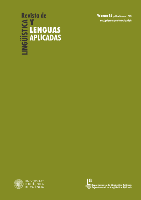
Revista de Linguistica y Lenguas Aplicadas
Empowering Voices Through Open Access KnowledgeRevista de Linguistica y Lenguas Aplicadas, an esteemed journal published by UNIV POLITECNICA VALENCIA, EDITORIAL UPV, is a pivotal resource in the field of linguistics and applied languages. Since its inception, the journal has embraced Open Access publishing since 2006, ensuring that its rich repository of research is readily available to a global audience of researchers, academics, and language professionals. Headquartered in Valencia, Spain, the journal contributes significantly to the advancement of linguistics knowledge, boasting a respectable ranking within the Q3 quartile for Linguistics and Language (2023) according to Scopus metrics. It covers a diverse range of topics and methodologies, engaging readers through its commitment to scholarly rigor and innovation. The journal is uniquely positioned to inform and inspire essential discussions from 2015 to 2024, making it a vital platform for emerging linguists and seasoned scholars alike, as they explore the evolving landscapes of language and communication.
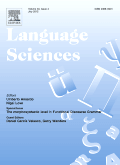
LANGUAGE SCIENCES
Bridging Disciplines in Language ResearchLANGUAGE SCIENCES, published by Elsevier Science Ltd, stands as a prominent journal in the field of linguistics and language studies. With an impressive impact factor that solidifies its reputation, it holds a Q1 ranking in both the linguistics and language categories for 2023, reflecting its excellence and relevance in cutting-edge research. Since its inception in 1979, this journal has evolved to encompass a wide range of interdisciplinary studies, providing a platform for innovative research that addresses the complexities of language use, acquisition, cognition, and social interactions. The journal is hosted in the United Kingdom and features rigorous peer-reviewed articles that contribute significantly to both the academic community and practical applications in language-related fields. With access options tailored for a diverse range of readers and contributors, LANGUAGE SCIENCES invites scholars, students, and professionals to engage with its comprehensive body of work and contribute to the ongoing discourse in linguistics.

Languages
Unveiling the complexities of communication in a global context.Languages, published by MDPI, is a prestigious open-access journal dedicated to the field of Linguistics and Language studies. Since its inception in 2016, this journal has rapidly established itself as a leading platform for high-quality research, achieving an impressive Q1 ranking in 2023 and standing out in both the Arts and Humanities as well as the Social Sciences categories with significant percentile rankings (76th and 74th respectively). Based in Switzerland, Languages fosters an international community of scholars who are committed to exploring the multifaceted dimensions of language, from theoretical frameworks to practical applications. With a robust e-ISSN of 2226-471X, the journal prioritizes accessibility, allowing researchers, professionals, and students to freely engage with cutting-edge research and insights. By bridging the gap between theory and practice, Languages plays a crucial role in advancing our understanding of linguistic phenomena, making it an invaluable resource for anyone invested in the study of language.

Russian Journal of Linguistics
Elevating Linguistic Scholarship to New HeightsWelcome to the Russian Journal of Linguistics, a prestigious journal published by Peoples Friendship University of Russia that has made significant strides in the realm of linguistic studies since its inception. With an Open Access policy established in 2019, this journal provides unparalleled opportunities for researchers, professionals, and students to share and disseminate groundbreaking linguistic research. The journal is currently ranked in the Q1 category for Linguistics and Language and boasts impressive Scopus rankings, placing 129th out of 1088 in the Arts and Humanities, and 148th out of 1167 in the Social Sciences. Focusing on a diverse range of linguistics topics, the journal aims to facilitate cross-disciplinary dialogue and foster advancements in the study of language. Located in Moscow, Russia, it champions the vibrant linguistic community by consistently publishing high-quality research that contributes to the global understanding of language dynamics. We invite you to explore the wealth of knowledge and insight the Russian Journal of Linguistics has to offer.

Cognitive Studies-Etudes Cognitives
Connecting Theory to Practice in Cognitive ResearchCognitive Studies-Etudes Cognitives, published by the Polish Academy of Sciences, Institute of Slavic Studies, is a prominent open-access journal based in Poland, dedicated to advancing research in the interdisciplinary fields of cognitive studies, communication, and linguistics. Since its inception, the journal has made a significant impact in the academic community, evidenced by its ranking in the Scopus database within the top 30% for Language and Linguistics. With an aim to bridge theoretical insights and practical applications, Cognitive Studies invites contributions that explore the complex interplay between language, cognition, and technology, making it a vital resource for researchers, professionals, and students alike. As the journal continues to grow, it remains committed to maintaining rigorous standards for publication while fostering an inclusive environment for innovative ideas and diverse perspectives. The journal is easily accessible and aims to facilitate knowledge dissemination, proudly offering open access since 2014.

JOURNAL OF PSYCHOLINGUISTIC RESEARCH
Bridging Disciplines to Illuminate Language UnderstandingJOURNAL OF PSYCHOLINGUISTIC RESEARCH is a premier scholarly publication dedicated to the interdisciplinary exploration of language and cognition. Established in 1971 and published by Springer/Plenum Publishers, this journal serves as a vital platform for researchers in Experimental and Cognitive Psychology, Linguistics, and related fields. With an impressive reputation reflected in its 2023 Category Quartiles—Q3 in Experimental and Cognitive Psychology, Q1 in Linguistics and Language, and Q2 in Psychology (miscellaneous)—the journal ranks prominently within the Scopus database, reaching the 88th percentile in Language and Linguistics. Researchers and professionals have the opportunity to disseminate their findings effectively, enriching contemporary understanding of psycholinguistic phenomena through rigorous peer-reviewed articles. Although currently not an open-access journal, it provides extensive access options that cater to a global audience, ensuring that the latest research is readily available to those dedicated to advancing this dynamic field. We invite scholars, practitioners, and students to engage with this essential resource for fresh insights and innovative research methodologies.
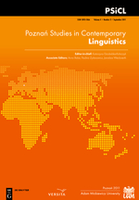
Poznan Studies in Contemporary Linguistics
Elevating linguistic insights for a global audience.Poznan Studies in Contemporary Linguistics, published by DE GRUYTER MOUTON, is a pivotal journal in the field of linguistics, with an ISSN of 0137-2459 and an E-ISSN of 1897-7499. Located in Germany, this esteemed journal has consistently contributed to the academic landscape since its inception. As of 2023, it holds a Q2 category rank in Linguistics and Language and boasts commendable Scopus rankings, featuring in the 69th percentile for Arts and Humanities and the 66th percentile for Social Sciences. The journal emerges as a vital platform for scholars to explore contemporary linguistic theories and practices, making it an essential resource for researchers, professionals, and students alike. With a converged publication period from 2007 to 2024, it aims to facilitate a deeper understanding of linguistic advancements and trends. While the journal currently does not offer open access, its rigorous peer-review process ensures the highest quality of published research, strengthening its role as a leading discourse in the dynamic field of linguistics.

RUSSIAN LINGUISTICS
Illuminating the intersections of language and psychology.RUSSIAN LINGUISTICS is a peer-reviewed academic journal published by Springer, dedicated to advancing the understanding of the Russian language and its interplay with various linguistic frameworks. With a longstanding history that spans from its inception in 1974, the journal encompasses a broad range of topics within the fields of linguistics and language studies, offering valuable insights especially in *Developmental and Educational Psychology* and the intricacies of linguistics at large. Currently ranked in the Q2 quartile for Linguistics and Language, and holding substantial positions within Scopus rankings, RUSSIAN LINGUISTICS serves as an essential resource for researchers, educators, and students alike, fostering dialogue and collaboration within the international linguistic community. The journal notably provides critical access to research findings that enhance the comprehension of Russian linguistics' role in a global context, despite operating under a traditional access model. For those pursuing scholarly excellence, RUSSIAN LINGUISTICS remains a pivotal platform for disseminating innovative research and promoting the study of language.
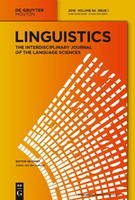
LINGUISTICS
Advancing the Frontiers of Linguistic ResearchLINGUISTICS, published by De Gruyter Mouton, stands as a leading journal in the field of linguistics, exemplifying innovation and scholarly rigor. With its roots tracing back to 1963 and a commitment to advancing linguistic research, this journal has consistently achieved Q1 status in both the Linguistics and Language category, marking it among the top-tier journals in the discipline. The journal is indexed with impressive rankings in Scopus, evidenced by its position within the 84th percentile in Language and Linguistics, and 83rd percentile in Social Sciences, demonstrating its significant influence and reach among scholars. Transitioning to Open Access since 2022, LINGUISTICS enhances accessibility and fosters a wider dissemination of knowledge. Published in Germany and backed by a reputable publisher, LINGUISTICS is dedicated to exploring diverse topics in linguistics, making it essential reading for researchers, professionals, and students aiming to stay at the forefront of linguistic scholarship.